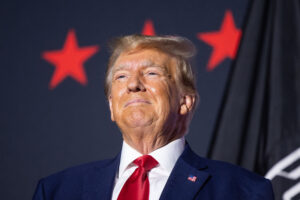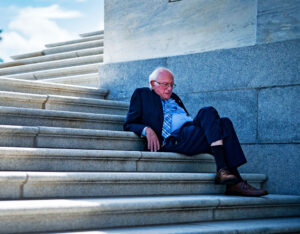When Peter Navarro stood in front of a Washington DC courthouse to speak to the press after a trial convicted him of contempt of Congress last week, he was repeatedly heckled by a woman with a sign yelling “Traitor!” He faces up to two years in prison and a fine of up to $100,000. It was a sorry spectacle and the ignominious nadir to a once-promising career.
Navarro, even more than his former boss, Donald Trump, represented the Janus-faced aspect of the Trump movement. On the one hand, he was an often-brilliant maverick economist who correctly diagnosed the fallacies and imbalances of the pre-2016 globalised world order, calling out America’s dependence on China and warning of the consequences of an eroding domestic industrial base. On the other, he was the partisan hatchet-man par excellence who just as well embodied the hard-edged conspiratorial lunacy that’s consumed the energies of the American Right. How the economic prophet and the political sycophant co-existed, before the latter overshadowed and eventually consumed the former, is the tragic story of the Trump movement writ large.
Of course, the story isn’t over and Trump himself, if not Navarro and his other former advisers, could very well emerge politically stronger from his legal battles. But the story of Navarro should nonetheless provoke some reflection: for it can serve as an instructive warning about what happens when politics is severed from its policy content or, indeed, from any larger moral objective — and becomes simply about the prosecution of feuds based on pure friend-enemy distinctions. Indeed, the many media reports of Navarro’s trial make little mention of his prodigious policy background: he is simply described as a Trump adviser, but digging deeper into his record and publications reveals a thinker ahead of his time.
After earning his doctorate in economics at Harvard, Navarro held a number of teaching posts at the University of California in the Eighties, from where he authored dozens of books and articles on everything from trade and energy policy to the fortunes of the working class and the capture of Congress by lobbyists. He often wrote in a strident, headstrong style, assailing the political class and its takeover by special interests. At this time, however, Navarro was still very much a free-trade advocate, lending his authority to the general Washington consensus about the desirability of further global market integration, and warning against the use of tariffs and trade protectionism.
He said as much in his 1984 book, The Policy Game: How Special Interests and Ideologues are Stealing America, sounding every bit like a faithful devotee of Ricardian economics: “If the world is, in fact, sucked into this spiral, enormous gains from trade will be sacrificed. While such a sacrifice might save some jobs in sheltered domestic industries, it will destroy as many or more in other home industries, particularly those that rely heavily on export trade.” These sentiments would later be cited by his media critics to embarrass him when he radically changed course and became a militant trade hawk.
In these years, Navarro was a political transient, alternating between Republican, Democratic, and Independent registrations. He ran for Congress in the Nineties as a Clinton Democrat, garnering the endorsement of the First Lady, and highlighted his liberal stances on the environment, abortion, and gay rights, while authoring a primer for investors to take advantage of global trade networks. His support for the Clintons lasted, at least nominally, until 2008, when Hillary first ran for president — at which point he became disillusioned and drifted away from the centrist mainstream, feeling that conventional liberals and conservatives alike were letting America down just as the globalised economic system was beginning to crack. He would find a new political home and a new presidential patron soon enough.
It was a couple of years after this that Navarro co-authored a book called Death by China: Confronting the Dragon – A Global Call to Action, which read like a manifesto for a future populist-nationalist agenda. Building off on an earlier title, The Coming China Wars, Navarro gave rhetorical voice to his long-running economic critique of Chinese duplicity and American complicity in the then-still sacrosanct globalised world order, marshalling his research into an aggressive, almost pugilistic attack. The book especially catalogued the many abuses that had become common practice for the Chinese government after its American-sponsored accession to the World Trade Organization 10 years earlier: currency manipulation, unauthorised trade subsidies, use of slave labour, and intellectual property theft.
US policymakers, however, chose to turn a blind eye to these already well-known Chinese policies, under the illusion — still guiding both parties — that China could eventually be tamed and habituated into liberal norms through progressive integration into the US-led global order. The book was turned into a documentary (narrated by Martin Sheen) and one review from the New York Times acknowledged that Navarro’s claims were worthy of examination but criticised it for its “alarming and alarmist” style, with its “an abundance of inflammatory language and cheesy graphics”. If liberal outlets like the NYT had taken Navarro’s arguments more seriously, perhaps they wouldn’t have been caught off guard by the political backlash that came in 2016, when Donald Trump’s campaign took these grievances on the road.
Navarro’s prescience made him a logical choice to serve in a trade portfolio in the new administration. And from within his perch as Director of the Office of Trade and Manufacturing Policy, Navarro set to work altering America’s trade strategy, applying the same bluster he had displayed as a commentator, and clashing as much with traditional Republicans as with the White House’s Democratic and liberal media opponents. His goal was to displace the free-trade orthodoxy he had once championed. Navarro’s influence could be seen in the administration’s break with the Trans-Pacific Partnership on day one, the trade war with China, and the renegotiation of Nafta (after which Navarro said there would be a “special place in hell” for Justin Trudeau for retaliating against Trump on steel tariffs).
A proposed $1 trillion infrastructure plan Navarro had worked out with then-Commerce Secretary Wilbur Ross could possibly have allowed the Trump administration to deliver on its promises to rebuild America — had Republicans in Congress not scuttled the scheme. (Now, Trump’s failure on infrastructure is routinely mocked by Biden, who has effectively aped the same strategy.) Overall, Navarro’s role had been to interpret and distil Trump’s broad directives into actionable policies and he had excelled in it. The moment of truth came with the early 2020 outbreak of the coronavirus pandemic, in which the best and worst of Navarro’s instincts came to the fore.
In response to early reports of a Chinese-originated virus, Navarro was quick to argue for providing massive new fiscal appropriations to keep the country safe along with restricting travel to and from China (just as Trump’s other advisers were calling for giving out visas to wealthy Chinese investors). Aside from being an early vocal advocate for supply-chain resiliency, Navarro played a leading role in coordinating Operation Warp Speed, which utilised the Defense Production Act to mobilise resources toward the development of a vaccine.
But even as he took charge of the administration’s central policy response, Navarro endorsed quack cures like hydroxychloroquine, while repeatedly blaming Anthony Fauci, not just for initiating lockdowns, but for being responsible for the virus itself, alleging that he had funded the Chinese lab that bred the disease (and, therefore, was “the father” of Covid-19). This strange combination of the qualities in Peter Navarro, the confident and the paranoid, the substantive and the conspiratorial, the clear-eyed policymaker and the schoolyard tough guy, just about sums up the legacy of the Trump era. Its greatest executive achievement had been Operation Warp Speed — a project that would have marked any other presidency for political greatness — but due to the Right’s aversion to showing support for anything resembling “Fauci-ism”, Trump himself later came to disown Warp Speed, downplaying the importance of Navarro’s policy masterstroke.
Navarro himself didn’t seem to mind. He was loyal to his boss and backed Trump to the hilt in his vainglorious scorched-earth attempt to claim victory in the 2020 election — a delusional struggle that had nothing whatsoever to do with any specific policy or governing programme. At this point, whatever larger policy goals had caused Navarro to support the former president had become entirely subordinate to his personal loyalty to the man himself.
Indeed, whenever, he appears in public nowadays, Navarro never speaks about such mundane things as the balance of trade or steel tariffs or industrial policy anymore. It is only ever to replay and endlessly litigate the election of 2020, which the vast majority of American voters have already moved on from. Navarro the economist had been completely devoured and digested by Navarro the courtier. Policy had become utterly meaningless before the friend-enemy distinction. As Slavoj Žižek would say, it is the Lacanian “surplus enjoyment” of intensifying partisan antagonism, far more than any serious ideological content, which has come to largely sustain American politics.
Peter Navarro could have earned a place in history as the brain trust of the Trump presidency, what the New Deal intellectuals had been to FDR, or what John Kenneth Galbraith had been to JFK. Along with fellow trade hawk Robert Lighthizer, he provided enough vision and academic heft to mount a genuine economic transformation. But he was always outnumbered by traditional Republicans such as Paul Ryan and Larry Kudlow, which is why the administration’s great legislative achievement was instead a George W. Bush-style tax cut. And he never had enough discipline to stay focused on the long game. In the end, largely due to the uneven and haphazard qualities of advisers such as Navarro, the Trump years will, to misquote Leon Trotsky, be remembered not as a revolution betrayed but as a revolution fumbled.
Disclaimer
Some of the posts we share are controversial and we do not necessarily agree with them in the whole extend. Sometimes we agree with the content or part of it but we do not agree with the narration or language. Nevertheless we find them somehow interesting, valuable and/or informative or we share them, because we strongly believe in freedom of speech, free press and journalism. We strongly encourage you to have a critical approach to all the content, do your own research and analysis to build your own opinion.
We would be glad to have your feedback.
Source: UnHerd Read the original article here: https://unherd.com/



